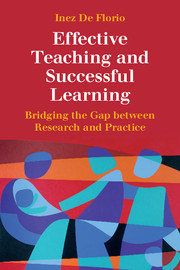Book contents
- Frontmatter
- Epigraph
- Contents
- Preface
- Introduction
- 1 Main Features of Scientific Research on Education
- 2 Important Types of Scientific Research on Education
- 3 Main Features of Evidence-based Research on Education
- 4 Meta-Analyses on Education
- 5 A Synthesis of Over 800 Meta-Analyses Relating to Achievement
- 6 Scaffolding Effective Teaching and Successful Learning
- 7 Planning and Starting the Lesson
- 8 Presenting Knowledge and Skills – Assertive Questioning
- 9 Guided and Independent Practice
- 10 Cooperative and Project-based Learning
- 11 Feedback – Reciprocal and Informative
- Concluding Remarks: Standards Need More Evidence
- References
- Index
Introduction
Published online by Cambridge University Press: 05 June 2016
- Frontmatter
- Epigraph
- Contents
- Preface
- Introduction
- 1 Main Features of Scientific Research on Education
- 2 Important Types of Scientific Research on Education
- 3 Main Features of Evidence-based Research on Education
- 4 Meta-Analyses on Education
- 5 A Synthesis of Over 800 Meta-Analyses Relating to Achievement
- 6 Scaffolding Effective Teaching and Successful Learning
- 7 Planning and Starting the Lesson
- 8 Presenting Knowledge and Skills – Assertive Questioning
- 9 Guided and Independent Practice
- 10 Cooperative and Project-based Learning
- 11 Feedback – Reciprocal and Informative
- Concluding Remarks: Standards Need More Evidence
- References
- Index
Summary
In this introduction the starting point and the aims of the book are briefly stated, followed by the chapter summaries.
PREMISES
In the past decades, more rigid concepts of research gathered momentum in the social sciences, and subsequently in scientific approaches to teaching and learning. What is undoubtedly a gain per se may have unexpected and undesirable consequences for teachers and learners:
• Many important aspects of teaching and learning are beyond experimental research; others still wait to be investigated.
• In general, there is too much emphasis on Randomized Controlled Trials (RCTs), often considered as a panacea for all educational problems.
• On the other hand, important results from the social sciences are neglected or even considered as unscientific: for example, studies on intuition and teacher personality, as well as research into different ways to make ideas and learning stick.
• Standards-based education is not sufficiently aligned with evidence-informed teaching and learning.
• For educators and students alike it is often difficult to find their way through the maze of scientific results, that is to say, to select those procedures that are most appropriate for the learners in a specific context.
• There are too many guides and “cookbooks” that indiscriminately propagate, not to say preach, dozens of techniques and strategies without helping teachers and learners to sort the wheat from the chaff.
• Even though many suggestions may be suitable for many learning contexts, what to adopt and adapt is the choice of the teacher. Otherwise the professionalism of educators is at risk, reducing them to puppets on a string.
AIMS
Effective teaching and successful learning are quite possible if we look at research through the eyes of educators who want to obtain the best results for all their learners.
- Type
- Chapter
- Information
- Effective Teaching and Successful LearningBridging the Gap between Research and Practice, pp. 1 - 7Publisher: Cambridge University PressPrint publication year: 2016



